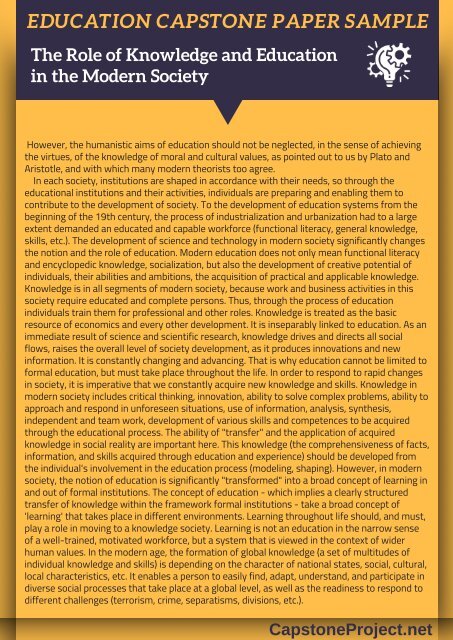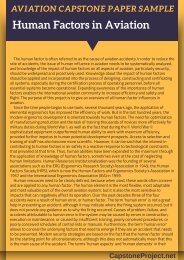education-capstone-paper-sample
Get best education capstone paper sample here https://www.capstoneproject.net/our-capstone-projects/education-capstone-project/
Get best education capstone paper sample here https://www.capstoneproject.net/our-capstone-projects/education-capstone-project/
- No tags were found...
You also want an ePaper? Increase the reach of your titles
YUMPU automatically turns print PDFs into web optimized ePapers that Google loves.
CapstoneProject.net<br />
EDUCATION CAPSTONE PAPER SAMPLE<br />
The Role of Knowledge and Education<br />
in the Modern Society<br />
However, the humanistic aims of <strong>education</strong> should not be neglected, in the sense of achieving<br />
the virtues, of the knowledge of moral and cultural values, as pointed out to us by Plato and<br />
Aristotle, and with which many modern theorists too agree.<br />
In each society, institutions are shaped in accordance with their needs, so through the<br />
<strong>education</strong>al institutions and their activities, individuals are preparing and enabling them to<br />
contribute to the development of society. To the development of <strong>education</strong> systems from the<br />
beginning of the 19th century, the process of industrialization and urbanization had to a large<br />
extent demanded an educated and capable workforce (functional literacy, general knowledge,<br />
skills, etc.). The development of science and technology in modern society significantly changes<br />
the notion and the role of <strong>education</strong>. Modern <strong>education</strong> does not only mean functional literacy<br />
and encyclopedic knowledge, socialization, but also the development of creative potential of<br />
individuals, their abilities and ambitions, the acquisition of practical and applicable knowledge.<br />
Knowledge is in all segments of modern society, because work and business activities in this<br />
society require educated and complete persons. Thus, through the process of <strong>education</strong><br />
individuals train them for professional and other roles. Knowledge is treated as the basic<br />
resource of economics and every other development. It is inseparably linked to <strong>education</strong>. As an<br />
immediate result of science and scientific research, knowledge drives and directs all social<br />
flows, raises the overall level of society development, as it produces innovations and new<br />
information. It is constantly changing and advancing. That is why <strong>education</strong> cannot be limited to<br />
formal <strong>education</strong>, but must take place throughout the life. In order to respond to rapid changes<br />
in society, it is imperative that we constantly acquire new knowledge and skills. Knowledge in<br />
modern society includes critical thinking, innovation, ability to solve complex problems, ability to<br />
approach and respond in unforeseen situations, use of information, analysis, synthesis,<br />
independent and team work, development of various skills and competences to be acquired<br />
through the <strong>education</strong>al process. The ability of "transfer" and the application of acquired<br />
knowledge in social reality are important here. This knowledge (the comprehensiveness of facts,<br />
information, and skills acquired through <strong>education</strong> and experience) should be developed from<br />
the individual's involvement in the <strong>education</strong> process (modeling, shaping). However, in modern<br />
society, the notion of <strong>education</strong> is significantly "transformed" into a broad concept of learning in<br />
and out of formal institutions. The concept of <strong>education</strong> - which implies a clearly structured<br />
transfer of knowledge within the framework formal institutions - take a broad concept of<br />
'learning' that takes place in different environments. Learning throughout life should, and must,<br />
play a role in moving to a knowledge society. Learning is not an <strong>education</strong> in the narrow sense<br />
of a well-trained, motivated workforce, but a system that is viewed in the context of wider<br />
human values. In the modern age, the formation of global knowledge (a set of multitudes of<br />
individual knowledge and skills) is depending on the character of national states, social, cultural,<br />
local characteristics, etc. It enables a person to easily find, adapt, understand, and participate in<br />
diverse social processes that take place at a global level, as well as the readiness to respond to<br />
different challenges (terrorism, crime, separatisms, divisions, etc.).




